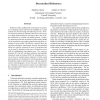Free Online Productivity Tools
i2Speak
i2Symbol
i2OCR
iTex2Img
iWeb2Print
iWeb2Shot
i2Type
iPdf2Split
iPdf2Merge
i2Bopomofo
i2Arabic
i2Style
i2Image
i2PDF
iLatex2Rtf
Sci2ools
101
click to vote
CSFW
2006
IEEE
2006
IEEE
Decentralized Robustness
Robustness links confidentiality and integrity properties of a computing system and has been identified as a useful property for characterizing and enforcing security. Previous characterizations of robustness have been with respect to a single idealized attacker; this paper shows how to define robustness for systems with mutual distrust. Further, we demonstrate that the decentralized label model (DLM) can be extended to support fine-grained reasoning about robustness in such systems. The DLM is a natural choice for capturing robustness requirements because decentralized labels are explicitly expressed in terms of principals that can be used to characterize the power of attackers across both the confidentiality and integrity axes. New rules are proposed for statically checking robustness and qualified robustness using an extended DLM; the resulting type system is shown to soundly enforce robustness. Finally, sound approximations are developed for checking programs with bounded bu...
CSFW 2006 | Decentralized Labels | Robustness | Robustness Links Confidentiality | Security Privacy |
Related Content
| Added | 10 Jun 2010 |
| Updated | 10 Jun 2010 |
| Type | Conference |
| Year | 2006 |
| Where | CSFW |
| Authors | Stephen Chong, Andrew C. Myers |
Comments (0)

